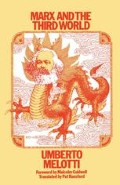Abstract
Of all the forms of commune that developed out of the primitive commune, ‘the Asiatic form necessarily hangs on most tenaciously and for the longest time. This is due to its presupposition that the individual does not become independent vis-à-vis the commune; that there is a self-sustaining circle of production, unity of agriculture, manufactures, etc.’1
Access this chapter
Tax calculation will be finalised at checkout
Purchases are for personal use only
Preview
Unable to display preview. Download preview PDF.
Notes
This view of the origins of the Asiatic State has been criticised for its alleged ‘circularity’, though some authors in search of an easier target have preferred to attack Wittfogel rather than Marx. So Leach, for instance, taking issue with Wittfogel, asserts that a theory of this type is completely circular, since it attributes the rise of the State to major hydraulic engineering works, while these presuppose the existence of the State. (Cf. E. R. Leach, ‘Hydraulic Society in Ceylon’, in Past and Present (London), no. 15 (Apr. 1959) p. 5). Similarly, others state the obvious fact that ‘it was not hydraulic works which created or stabilised despotic power’, but ‘on the contrary, it was despotic institutions and armies which enabled large-scale hydraulic works to be carried out’ — the words of a recent critic, Vittorio Saltini, in ‘Le comuni dell’ Antica Cina’ (in L’Espresso (Rome), year XVII, no. 34, 22 Aug. 1971, p. 19), a review of various studies on the Asiatic setting and the Asiatic mode of production, with particular reference to Jacques Gernet’s La Chine Ancienne (Presses Universitaires de France, Paris, 1964, p. 81; Italian trans., Il Saggiatore, Milan, 1971). On the other hand Eberhard, one of the earliest critics of the ‘theory of Asiatic society’, says that the need to build, maintain and operate a vast irrigation system could not have been what gave rise first to a bureaucracy and then to a despotic State, because ‘all irrigation systems, up to our own times, were’ — in Eberhard’s opinion, we would emphasise — ‘built, administered and maintained, or at least administered and maintained, by peasant co-operatives’. (Wolfram Eberhard, Geschichte Chinas, Berne, 1948; French trans., Payot, Paris, 1952, p. 63.) The expression ‘the theory of Asiatic society’ implies in itself that the target was Wittfogel, for it is the title of a work he wrote between the wars (Karl A. Wittfogel, ‘Die Theorie der Orientalischen Gesselschaft’, in Zeitschrift für Sozialforschung, vol. VII (1938) pp. 90–122
Marx, Grundrisse, p. 376; Eng. trans. p. 473. In a later work Marx says more realistically ‘under this system the sovereign is the principal landlord’. (Karl Marx, Theorien über den Mehrwert (1861–3), Dietz Verlag, Berlin, 1962, vol. II, p. 396.)
For the history of this term, and the ethnocentric overtones it has acquired through being all too often misemployed, see Franco Venturi, ‘Dispotismo orientale’, in Rivista Storica Italiana, vol. LXXII, no. 1 (1960) pp. 117–26
R. Koelbner, ‘Despot and Despotism: Vicissitudes of a Political Term’, in Journal of the Warburg and Courtauld Institutes, vol. XIV (1951) pp. 275–302
S. Stelling-Michaud, ‘Le mythe du despotisme oriental’, in Schweizer Beiträge zur allgemeinen Geschichte, vol. XVIII–XIX (1960–1) pp. 328–46.
In fact ‘general slavery’ is no more than the other face of ‘despotism’, both as the term is used by Marx and in its original meaning. ‘Despot’ comes from the Greek for ‘master’, more specifically’ slave-owner’. The ancient Greeks thought the position of the subjects of Asian kings a humiliating one, and called the kings ‘despots’. Naturally this attitude sprang largely from the typically self-centred nature of Greek culture, which also gave us the word ‘barbarian’, originally meaning ‘foreigner’. Most well-to-do Greeks conveniently forgot that their democracy was based on slave labour. Marx at any rate lifted both concepts from the Greeks, via Hegel, as his youthful writings attest. Thus in his critique of Hegel’s constitutional theory he quotes the following passage from Hegel: ‘The same particular character pertains to tasks imposed in the East, in Egypt in connection with colossal architectural undertakings and so forth. In these circumstances the principle of subjective freedom is lacking.’ (Karl Marx, Kritiek des Hegeischen Staatsrechts (1841–3), in Werke, vol. I, p. 262
Copyright information
© 1977 Palgrave Macmillan, a division of Macmillan Publishers Limited
About this chapter
Cite this chapter
Melotti, U. (1977). The Origins of Asiatic Society. In: Marx and the Third World. Palgrave Macmillan, London. https://doi.org/10.1007/978-1-349-15801-0_7
Download citation
DOI: https://doi.org/10.1007/978-1-349-15801-0_7
Publisher Name: Palgrave Macmillan, London
Print ISBN: 978-0-333-19817-9
Online ISBN: 978-1-349-15801-0
eBook Packages: Palgrave Political & Intern. Studies CollectionPolitical Science and International Studies (R0)

